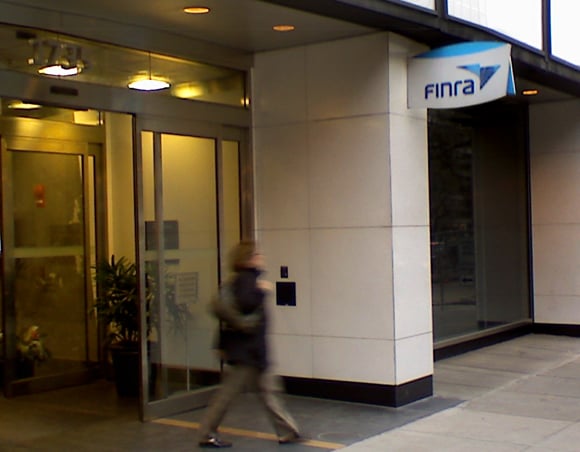Corporate-governance experts believe that seven proposals designed to make Finra disclose more information and give members a say on executive compensation may never be implemented.
Corporate-governance experts believe that seven proposals designed to make Finra disclose more information and give members a say on executive compensation may never be implemented, even though nearly 70% of those who voted in the regulator's recent election approved them.
Because they are non-binding, the Financial Industry Regulatory Authority Inc. board doesn't have to take any action on the proxy proposals. And the board made it clear that it was not in favor of the proposals, urging members prior to the election to reject them. The membership approved them anyway, by a 67% majority.
But Finra members don't have the same leverage as corporate shareholders have over company boards, said Les Greenberg, a Culver City, Calif.-based securities lawyer who follows governance issues. If corporate boards ignore shareholder wishes, shareholders can vote the directors off the board, Mr. Greenberg said. Even the threat of voting out board members gives shareholders "a little bit more leverage," he added.
Finra's board consists of 22 members, including 14 appointees.
The seven proposals ask Finra to give members a "say on pay" for top Finra officials, improve disclosure of Finra executive pay, make board meetings public, disclose Finra's investment activities and release an Internal Revenue Service opinion letter concerning NASD's $35,000 payment to members following the 2007 merger with the New York Stock Exchange's regulatory unit.
Nancy Condon, a spokeswoman for Finra, declined to comment for the story.
The proposals also ask for an inquiry into any connections Finra officials may have had with the Bernard Madoff firms. In addition, the proposals call for the creation of an independent inspector general for Finra.
A DIFFERENT RELATIONSHIP
As a regulator, Finra has a different relationship with its members than a public company has with its shareholders, said Jie Cai, assistant professor of finance at Drexel University.
"The mission for Finra is … to regulate member companies, and sometimes they may have to do something that's really unpopular with members," Mr. Cai said.
A say-on-pay process could create a sense of retaliation and "some sort of bargaining between Finra and the members it's supposed to be regulating," he said.
In its proxy, the Finra board made a similar argument, saying that a say-on-pay vote could "give an inappropriate perception of the membership's influence on the Finra regulatory program."
On the other hand, annual disclosure to members of executive compensation would create less of a conflict, Mr. Cai said.
Amerivet Securities Inc., which petitioned Finra to place the proposals on the ballot, wants executive pay to be disclosed in Finra's annual report, rather than just in its tax filings, because the IRS filings are less timely and not distributed to members.
The say-on-pay proposal and additional transparency for Finra's investment process are the most likely items to be addressed by the board, said Lisa Roth, chief executive of Keystone Capital Corp. and chairwoman of Finra's small-firm advisory board.
Ms. Roth was also a small-firm candidate appointed by Finra's nominating committee in this month's election. She lost to an independent candidate. Ms. Roth supported four of the seven proposals.
Say-on-pay proposals are already commonplace, she said. In addition, under the Dodd–Frank Wall Street Reform and Consumer Protection Act, periodic non-binding say-on-pay proposals will be required for public companies.
The investment industry's own standards of portfolio transparency could be followed by Finra, said Ms. Roth, who added that she does not have direct knowledge of what Finra's board might be considering.
The advisory board will be discussing the proxy proposals, Ms. Roth said, and the full board is expected to start reviewing the proposals at its next meeting in September.
"I'm anxious to see what Finra does with those proposals," she added.
Smaller firms, defined as those with fewer than 150 registered representatives, supported the proposals by 70%-plus margins in the election.
These small broker-dealers are upset that after the big Wall Street firms failed in 2008 and Finra itself suffered $568 million in investment losses, Finra executives awarded themselves significant pay and bonuses, said John Busacca, owner of the Broker Dealer Exchange LLC.
That year, 11 Finra executives had total compensation of $1 million or more, some of which includes retirement payouts. Then-Finra chief executive Mary Schapiro received $3.3 million in total pay, including $1.75 million in bonus and incentive compensation. Finra hasn't yet filed its 2009 tax return, so more-current pay data is not available.
Mr. Busacca is one of the founders of The Securities Industry Professional Association Inc., which organized the successful slate of small-firm board candidates elected at Finra's annual meeting Aug. 12.
One of those winning candidates, Ken Norensberg, managing director at Luxor Financial Group Inc., believes that the Finra board will consider the proposals.
"When you get an overwhelming number of votes, the powers that be will have to look at them," he said. "I won't speak for the board, but clearly, the members have spoken," he added.
The proxy vote "is a mandate" for more transparency, Mr. Busacca said. "If the [Finra board] ignores it, I would not be surprised to see another proxy battle."







